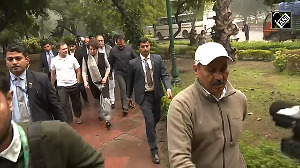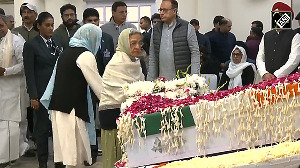Many terrorism experts have been concerned since 9/11 that if there is an act of terrorism involving nuclear material, it will most probably originate from Pakistan. Hence, their worries about the security of Pakistan's nuclear arsenal and about the possibility of radicalised Pakistani scientists helping Al Qaeda or pro-Al Qaeda organisations.
Is there a similar danger of an act of cyber terrorism, seeking to damage or destroy critical infrastructure, emanating from India because of the availability of qualified information technology experts in terror groups. This question is likely to occupy the attention of terrorism experts following the announcement by the Mumbai Police on October 6,2008, of the arrest of 20 suspected members of the so-called Indian Mujahideen (IM), who had played a role in the serial blasts in Ahmedabad on July 26,2008, in the abortive attempt to organise similar blasts in Surat the next day and in the serial blasts in New Delhi on September 13,2008.
Among those arrested are four IT-savvy members of the IM, who had played a role in sending the e-mail messages in the name of the IM before and after the Ahmedabad blasts and before the New Delhi blasts by hacking into Wi-fi networks in Mumbai and Navin Mumbai. These are :
Mohammed Mansoor Asgar Peerbhoy aka Munawar aka Mannu. A 31-year-old resident of Pune, who was reportedly working for Yahoo, India, on an annual salary of Rs. 19 lakhs (US $ 45,000).
Mubin Kadar Shaikh, a 24-year-old graduate of computer science from Pune.
Asif Bashir Shaikh, a 22-year-old mechanical engineer from Pune. In addition to helping in sending the E-mail messages, he also reportedly played a role in planting 18 Improvised Explosive Devices (IEDs) in Surat, all of which failed to explode.
Mohammed Ismail Chaudhary, a 28-year-old computer mechanic, who is also suspected to have helped in planting the IEDs in Surat.
Peerbhoy is reported to have joined the IM while he was studying Arabic in Pune's Quran Foundation, which seems to have served as a favourite recruiting ground for jihadi terrorism. The US intelligence agencies would be interested to know that he had allegedly visited the US twice in recent months. Did he go on his own or in connection with Yahoo's work? This is not clear.
Pune as an important recruiting centre for jihadi terrorism has come out of the investigation made so far by the Mumbai Police. One would recall with interest that Abu Zubaidah, the Palestinian, who was supposedly No.3 in Al Qaeda, was also reported to have studied computer science in Pune before crossing over into Pakistan and joining Al Qaeda. He was arrested in the house of a cadre of the Lashkar-e-Toiba (LET) in Faislabad in Pakistani Punjab in March,2002, and taken to the Guantanamo Bay detention centre in Cuba by the US intelligence. He was considered an IT expert of Al Qaeda.
Peerbhoy has been projected as self-radicalised during a visit to Saudi Arabia for Haj. Despite this, certain questions need to be gone into thoroughly -- were he and others self-radicalised or radicalised by Al Qaeda, which would welcome more IT experts? Were they recruits or volunteers as a result of their self-radicalisation? Were they working only for the IM or were they also helping Al Qaeda and other pro-Al Qaeda organisations?
Their capabilities as demonstrated till now are rather primitive relating to sending E-mail messages through hacked networks. Many young students can do this. Did they have any other capability of an ominous nature?
If the reports that Peerbhoy had visited the US twice in recent months are correct, it shows that he had a valid visa for the US, which he had probably got on the recommendation of Yahoo. It also shows that the Federal Bureau of Investigation (FBI) had no adverse information on him. Otherwise, the US would not have issued a visa to him. If he had managed to get himself transferred to one of the Yahoo offices in the US or in West Europe, Al Qaeda would have had a wonderful cyber sleeping cell in the West. Why did he weaken the possibility of his getting posted to the West one day by helping the IM in doing a simple job of communications, which did not require much expertise?
These and other questions of a similar nature require to be gone into in great detail, if necessary, by enlisting the help of the cyber experts of the US intelligence.






 © 2024 Rediff.com -
© 2024 Rediff.com -